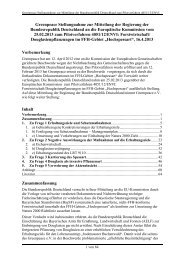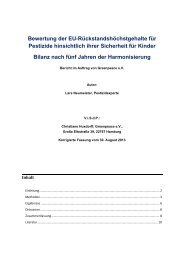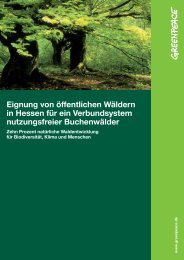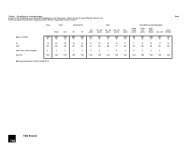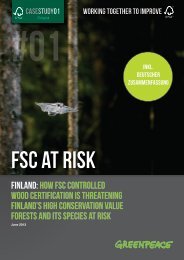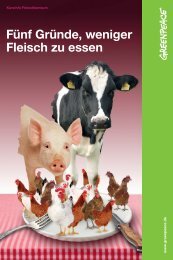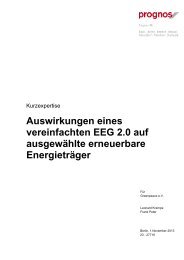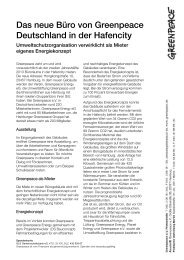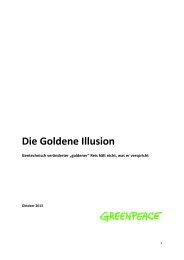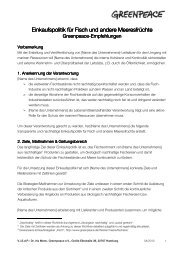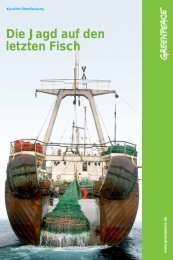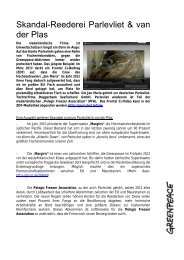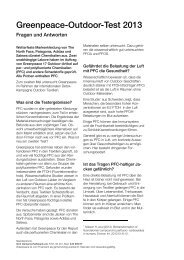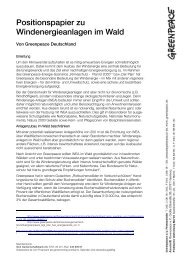HOW THE PALM OIL INDUSTRY IS - Greenpeace
HOW THE PALM OIL INDUSTRY IS - Greenpeace
HOW THE PALM OIL INDUSTRY IS - Greenpeace
You also want an ePaper? Increase the reach of your titles
YUMPU automatically turns print PDFs into web optimized ePapers that Google loves.
39<br />
Cargill – trading with Unilever<br />
‘Unfortunately, not every palm developer operates<br />
responsibly. Forests have been logged (sometimes<br />
illegally) to make room for palm plantations. Destroying<br />
forests to plant palm is a net negative for trapping carbon<br />
and mitigating climate change.’ 136<br />
Cargill News 2007<br />
Cargill is an RSPO member 137 and is the largest privately-held<br />
company in the world. 138 Cargill is a major plantation owner,<br />
trader, refiner and distributor of palm oil and palm oil products<br />
including biodiesel. It has palm oil related operations across<br />
Indonesia, Malaysia, Papua New Guinea, Europe, Australia,<br />
India, Russia, and the USA. 139<br />
Industry sources confirm that roughly half of the palm oil imported<br />
into Europe by Cargill comes from Indonesia. 140<br />
According to export data for the first half of 2007, Cargill’s<br />
Singapore trading arm exported at least 220,000 tonnes<br />
of palm oil from 13 different oil palm concession holders in<br />
Indonesia, some with holdings in Riau, including Astro Agro<br />
Group, Salim Group and Musim Mas. 141 Over 70,000 tonnes<br />
of this went to Germany, The Netherlands and Italy; 40,000<br />
tonnes was shipped to Malaysia; the remainder went to China,<br />
India and the rest of the world. 142<br />
Cargill’s palm oil shipments to Malaysia are likely to have been<br />
delivered to Cargill’s refineries in Port Klang and Kuantan, which<br />
export 90% of their production. 143<br />
For example, <strong>Greenpeace</strong> has traced palm oil from a Cargill<br />
refinery to Knorr soup, one of Unilever’s high profile brands.<br />
Every week, Unilever in Rotterdam places an order for about<br />
100 tonnes of refined palm oil with Cargill’s Hamburg refinery. 144<br />
This is trucked to the Unilever’s food processing plant in Poznań,<br />
Poland – the main production facility for Knorr brand products,<br />
which are exported all over the world, including Germany,<br />
the UK, Sweden, Belgium, The Netherlands, Russia, and the<br />
USA. 145 The facility uses palm oil in over 150 different products,<br />
mainly dehydrated food products like instant soup. 146<br />
Cargill is also one of Unilever’s European suppliers<br />
of palm oil for ice cream. 147<br />
The ADM-Kuok-Wilmar alliance –<br />
trading with Unilever<br />
Wilmar is an RSPO member. It claims to be the world’s largest<br />
producer of palm oil based biodiesel. 148 The group – effectively<br />
a shareholder alliance between ADM 149 and the Kuok family 150<br />
– controls over 570,000 hectares of concession area (just over<br />
a third of this has been cleared and planted), palm oil refineries<br />
and biodiesel plants across Indonesia and Malaysia. 151 In 2006,<br />
the group produced over 830,000 tonnes of crude palm oil,<br />
accounting for 6% of Indonesia’s production. 152 Although Wilmar<br />
owns substantial concession areas, more than 75% of its palm oil<br />
trade comes from third party plantations. 153<br />
The Kuok Group was founded by Robert Kuok Hock-<br />
Nien, the uncle of William Kuok, one of Wilmar’s founders.<br />
According to Forbes, in 2005, Robert Kuok Hock-Nien was<br />
the richest man in Asia. 154<br />
The US-headquartered ADM claims to be the world’s leading<br />
processor of agricultural crops and Europe’s leader in biofuels. 155<br />
The company trades crude palm oil on the Chicago futures<br />
market (ie contracts are signed and traded months ahead of<br />
delivery). 156 According to a high-level industry source, ADM is<br />
Cargill’s main competitor in the palm oil sector. 157<br />
In a 2006 declaration to institutional investors, Wilmar<br />
announced that its key international customers include<br />
Procter & Gamble, Cargill, Unilever, Nestlé and China Grains &<br />
Oils Group Corporation. 158<br />
Immediately next door to Unilever’s margarine factory outside<br />
London, a subsidiary of ADM operates a jetty handling more than<br />
300,000 tonnes of edible oils a year, including palm oil. These<br />
bulk oils are delivered to a wide range of food factories around the<br />
UK and overseas, as well as directly into the Unilever factory. 159<br />
This is the largest margarine factory in the world, 160 producing<br />
brands such as Flora and Bertolli. 161<br />
Golden Hope – trading with Unilever<br />
‘We are the first plantation company in Malaysia to receive<br />
the Global 500 Award by the United Nations Environment<br />
Programme (UNEP) for our “Zero Burning” practices’ 162<br />
Golden Hope 2006<br />
Golden Hope is an RSPO member. 163 Golden Hope<br />
controls plantations, refineries and biodiesel plants across<br />
Indonesia and Malaysia. 164<br />
In October 2007, Golden Hope was in the final legal stages<br />
of merging with Malaysian palm oil companies Kumpulan<br />
Guthrie and Sime Darby to form Synergy Drive. 165 All of these<br />
publicly listed companies are controlled by the Malaysian<br />
government. 166 Golden Hope’s website describes the deal as<br />
‘creating the world’s biggest palm oil entity’ and potentially ‘the<br />
world’s largest biofuels producer’. 167<br />
The company explicitly sees Indonesia<br />
as a place for expanding its business. 168<br />
While Golden Hope has long-established palm oil<br />
plantations in Peninsular Malaysia, the company now also<br />
controls a total area of 60,000 hectares in West Kalimantan,



